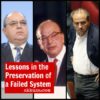GUEST POST: In this facebook post Christian Grima takes a good look at what it takes to get into the Auberge de Castille. The standards at the door are those set by bouncer par excellence Robert Abela. Who exactly is allowed in? (Post reproduced on akkuza.com with the author’s permission). Jekk il-Kap tal-Opposizzjoni biex jidhol […]






